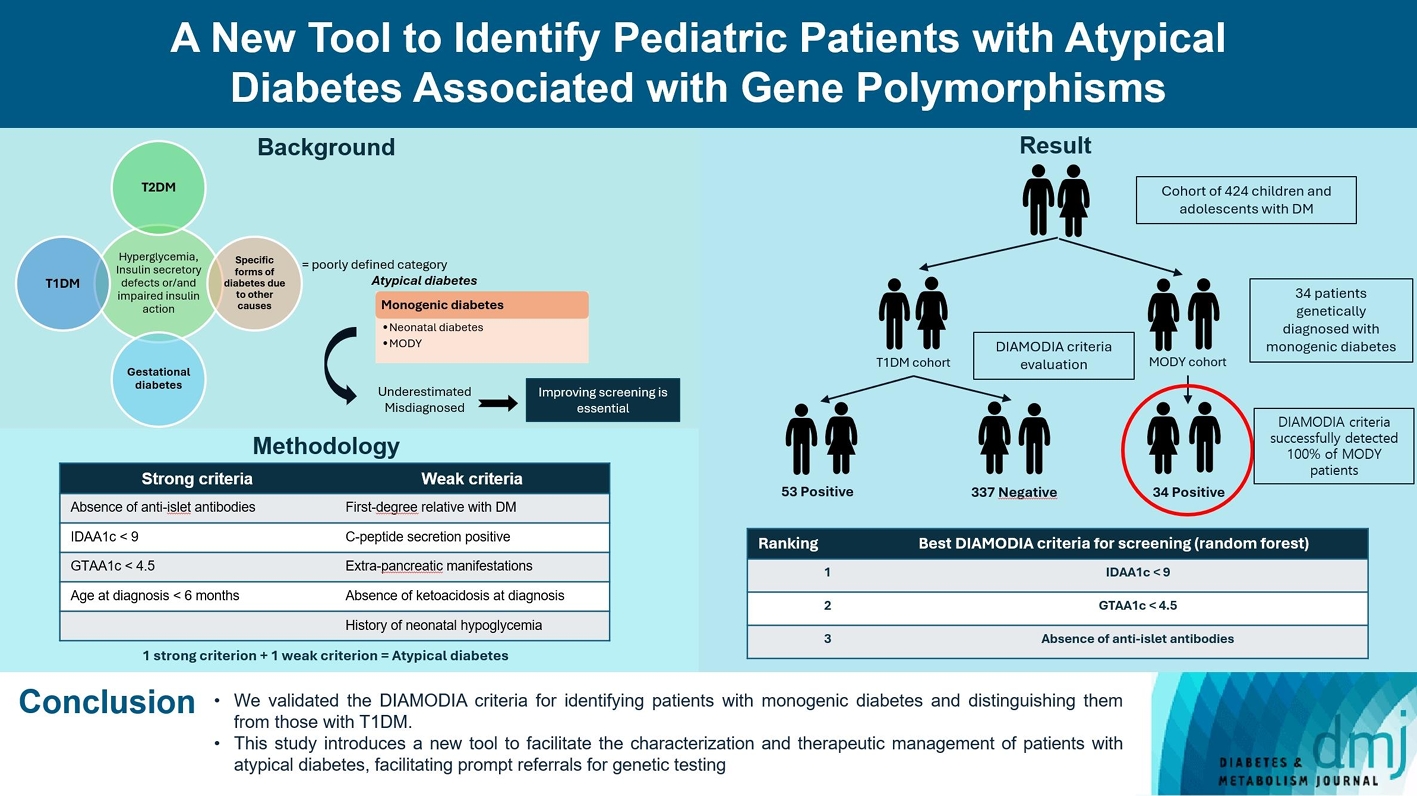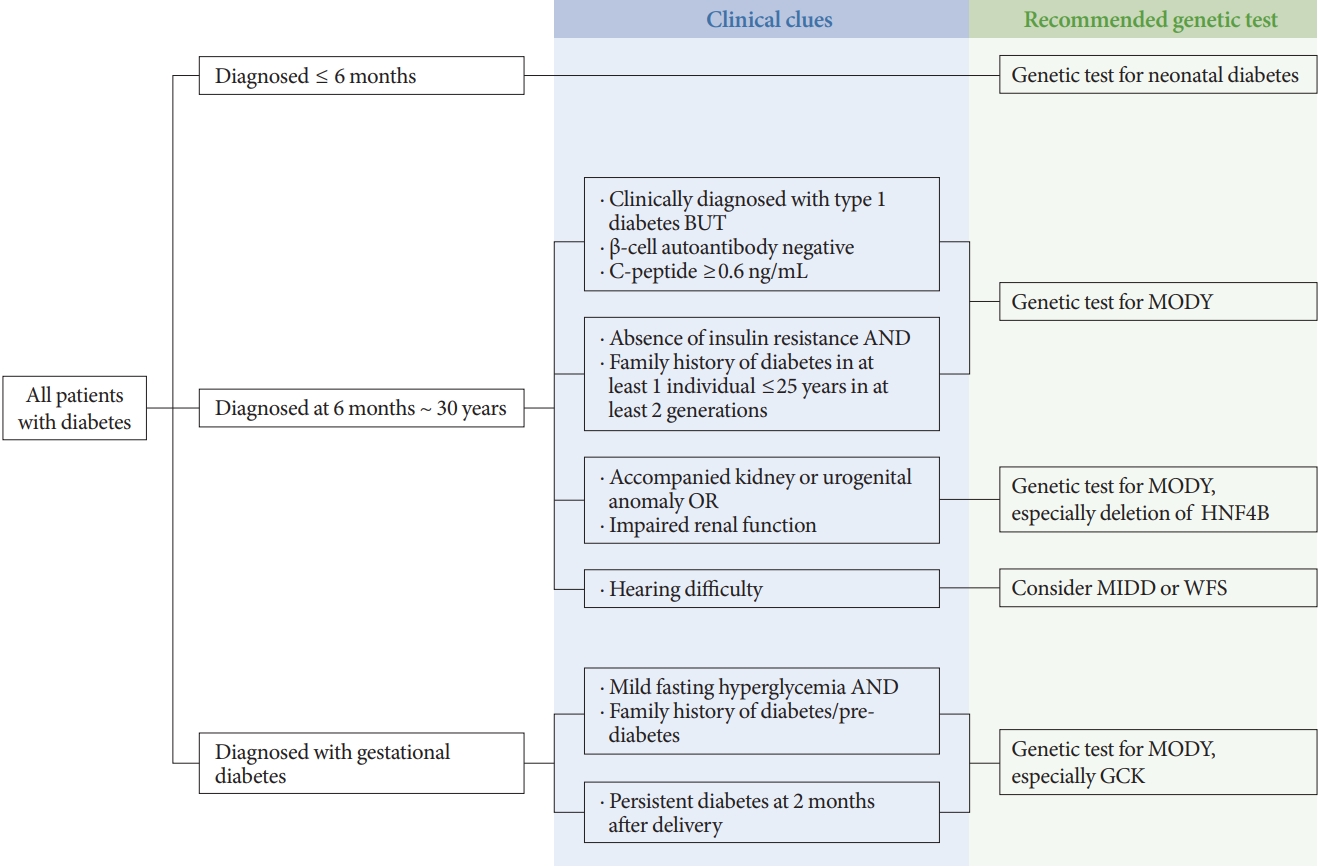
- Current
- Browse
- Collections
-
For contributors
- For Authors
- Instructions to authors
- Article processing charge
- e-submission
- For Reviewers
- Instructions for reviewers
- How to become a reviewer
- Best reviewers
- For Readers
- Readership
- Subscription
- Permission guidelines
- About
- Editorial policy
Search
- Page Path
- HOME > Search
Original Article
- Type 1 Diabetes
- A New Tool to Identify Pediatric Patients with Atypical Diabetes Associated with Gene Polymorphisms
- Sophie Welsch, Antoine Harvengt, Paola Gallo, Manon Martin, Dominique Beckers, Thierry Mouraux, Nicole Seret, Marie-Christine Lebrethon, Raphaël Helaers, Pascal Brouillard, Miikka Vikkula, Philippe A. Lysy
- Received May 26, 2023 Accepted November 25, 2023 Published online March 22, 2024
- DOI: https://doi.org/10.4093/dmj.2023.0166 [Epub ahead of print]

- 784 View
- 48 Download
-
 Abstract
Abstract
 PDF
PDF Supplementary Material
Supplementary Material PubReader
PubReader  ePub
ePub - Background
Recent diabetes subclassifications have improved the differentiation between patients with type 1 diabetes mellitus (T1DM) and type 2 diabetes mellitus despite several overlapping features, yet without considering genetic forms of diabetes. We sought to facilitate the identification of monogenic diabetes by creating a new tool that we validated in a pediatric maturity-onset diabetes of the young (MODY) cohort.
Methods
We first created the DIAgnose MOnogenic DIAbetes (DIAMODIA) criteria based on the pre-existing, but incomplete, MODY calculator. This new score is composed of four strong and five weak criteria, with patients having to display at least one weak and one strong criterion.
Results
The effectiveness of the DIAMODIA criteria was evaluated in two patient cohorts, the first consisting of patients with confirmed MODY diabetes (n=34) and the second of patients with T1DM (n=390). These DIAMODIA criteria successfully detected 100% of MODY patients. Multiple correspondence analysis performed on the MODY and T1DM cohorts enabled us to differentiate MODY patients from T1DM. The three most relevant variables to distinguish a MODY from T1DM profile were: lower insulin-dose adjusted A1c score ≤9, glycemic target-adjusted A1c score ≤4.5, and absence of three anti-islet cell autoantibodies.
Conclusion
We validated the DIAMODIA criteria, as it effectively identified all monogenic diabetes patients (MODY cohort) and succeeded to differentiate T1DM from MODY patients. The creation of this new and effective tool is likely to facilitate the characterization and therapeutic management of patients with atypical diabetes, and promptly referring them for genetic testing which would markedly improve clinical care and counseling, as well.
Review
- Genetics
- Update on Monogenic Diabetes in Korea
- Ye Seul Yang, Soo Heon Kwak, Kyong Soo Park
- Diabetes Metab J. 2020;44(5):627-639. Published online October 21, 2020
- DOI: https://doi.org/10.4093/dmj.2020.0214

- 6,601 View
- 242 Download
- 11 Web of Science
- 10 Crossref
-
 Abstract
Abstract
 PDF
PDF PubReader
PubReader  ePub
ePub - Monogenic diabetes, including maturity-onset diabetes of the young, neonatal diabetes, and other rare forms of diabetes, results from a single gene mutation. It has been estimated to represent around 1% to 6% of all diabetes. With the advances in genome sequencing technology, it is possible to diagnose more monogenic diabetes cases than ever before. In Korea, 11 studies have identified several monogenic diabetes cases, using Sanger sequencing and whole exome sequencing since 2001. The recent largest study, using targeted exome panel sequencing, found a molecular diagnosis rate of 21.1% for monogenic diabetes in clinically suspected patients. Mutations in glucokinase (GCK), hepatocyte nuclear factor 1α (HNF1A), and HNF4A were most commonly found. Genetic diagnosis of monogenic diabetes is important as it determines the therapeutic approach required for patients and helps to identify affected family members. However, there are still many challenges, which include a lack of simple clinical criterion for selecting patients for genetic testing, difficulties in interpreting the genetic test results, and high costs for genetic testing. In this review, we will discuss the latest updates on monogenic diabetes in Korea, and suggest an algorithm to screen patients for genetic testing. The genetic tests and non-genetic markers for accurate diagnosis of monogenic diabetes will be also reviewed.
-
Citations
Citations to this article as recorded by- Targeted gene panel analysis of Japanese patients with maturity‐onset diabetes of the young‐like diabetes mellitus: Roles of inactivating variants in the ABCC8 and insulin resistance genes
Tohru Yorifuji, Yoh Watanabe, Kana Kitayama, Yuki Yamada, Shinji Higuchi, Jun Mori, Masaru Kato, Toru Takahashi, Tokuko Okuda, Takane Aoyama
Journal of Diabetes Investigation.2023; 14(3): 387. CrossRef - Efficacy of acupuncture on cardiovascular complications in patients with diabetes mellitus in Korea: A nationwide retrospective cohort
Hyejin Jung, Tiana Won, Ga-Yeon Kim, Jowon Jang, Sujung Yeo, Sabina Lim
Journal of Integrative Medicine.2023; 21(2): 176. CrossRef - Identification of rare variants in candidate genes associated with monogenic diabetes in polish mody-x patients
Paulina Jakiel, K. Gadzalska, E. Juścińska, M. Gorządek, T. Płoszaj, S. Skoczylas, M. Borowiec, A. Zmysłowska
Journal of Diabetes & Metabolic Disorders.2023;[Epub] CrossRef - Genetic perspectives on childhood monogenic diabetes: Diagnosis, management, and future directions
Hong-Yan Sun, Xiao-Yan Lin
World Journal of Diabetes.2023; 14(12): 1738. CrossRef - Maturity-Onset Diabetes of the Young (MODY)
Seung Shin Park, Soo Heon Kwak
The Journal of Korean Diabetes.2022; 23(3): 157. CrossRef - The Genetic Spectrum of Maturity-Onset Diabetes of the Young (MODY) in Qatar, a Population-Based Study
Asma A. Elashi, Salman M. Toor, Ilhame Diboun, Yasser Al-Sarraj, Shahrad Taheri, Karsten Suhre, Abdul Badi Abou-Samra, Omar M. E. Albagha
International Journal of Molecular Sciences.2022; 24(1): 130. CrossRef - Age at Diagnosis and the Risk of Diabetic Nephropathy in Young Patients with Type 1 Diabetes Mellitus (Diabetes Metab J 2021;45:46-54)
Ye Seul Yang, Tae Seo Sohn
Diabetes & Metabolism Journal.2021; 45(2): 277. CrossRef - Sequencing Cell-free Fetal DNA in Pregnant Women With GCK-MODY
Soo Heon Kwak, Camille E Powe, Se Song Jang, Michael J Callahan, Sarah N Bernstein, Seung Mi Lee, Sunyoung Kang, Kyong Soo Park, Hak C Jang, Jose C Florez, Jong-Il Kim, Jong Hee Chae
The Journal of Clinical Endocrinology & Metabolism.2021; 106(9): 2678. CrossRef - Muscle strength, an independent determinant of glycemic control in older adults with long-standing type 2 diabetes: a prospective cohort study
Bo Kyung Koo, Seoil Moon, Min Kyong Moon
BMC Geriatrics.2021;[Epub] CrossRef - A rare, likely pathogenic GCK variant related to maturity-onset diabetes of the young type 2: A case report
Min-Kyung So, Jungwon Huh, Hae Soon Kim
Journal of Genetic Medicine.2021; 18(2): 132. CrossRef
- Targeted gene panel analysis of Japanese patients with maturity‐onset diabetes of the young‐like diabetes mellitus: Roles of inactivating variants in the ABCC8 and insulin resistance genes

 KDA
KDA
 First
First Prev
Prev





